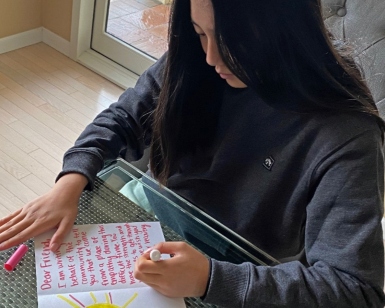San Rafael, CA – Even in this electronic age, an upbeat card in the good-old snailmail will brighten a recipient’s day. Marin County teens devoted to suicide prevention efforts have helped instigate a program to support recovery among Marin County residents who are particularly vulnerable, especially heading into the holiday season.
The Marin County Suicide Prevention Collaborative has initiated development of a Caring Cards program for the community. Following a national trend, Caring Cards include handwritten messages of concern and acceptance to such patients who self-define as socially excluded, abandoned and burdensome. The local program was suggested by the Suicide Prevention Collaborative’s Youth Action Team that also hosted a mental health and suicide prevention art and film showcase in September.
 Scarlett Goh of Mill Valley is a Youth Action Team member who has written letters to people recovering from mental health issues.
Scarlett Goh of Mill Valley is a Youth Action Team member who has written letters to people recovering from mental health issues.By the end of November, the program’s partner organizations will distribute Caring Cards to bring heartfelt messages of hope, recovery, and support to hospitalized patients and others who have been struggling with mental health, suicidality, substance use, or other behavioral health issues.
Kara Connors is the Marin Suicide Prevention Collaborative’s Senior Program Coordinator and part of the team from Marin County Behavioral Health and Recovery Services (BHRS). She said a patient’s discharge from an emergency room or other in-patient setting offers an opportunity for extra support when it is most needed for those recovering from mental health distress.
“Some patients may not have families or other social connections to provide support,” Connors said. “They may feel a sense of shame or embarrassment. Receiving handwritten messages like these will promote a sense of belonging and acceptance so life is worth living for them.”
Scarlett Goh, a high school junior from Mill Valley and member of the Youth Action Team, said the idea was discussed among her peers after a summer seminar.
“It was immediately apparent to us that people can feel really vulnerable after discharge from a mental health facility, especially if they are alone,” Goh said. “We then conducted research about Caring Cards and found a survey that reported more than 80% of psychiatric unit patients said receiving a ‘get well soon’ card would have helped their recovery.”
Research of other Caring Cards programs’ messaging and peer support has been proven to aid mental health patient recovery. A 2021 pilot study that investigated Caring Cards sent to Veterans Administration psychiatric patients one week after their discharge found that patients expressed positive experiences about the cards. The study also determined that 81% of the patients engaged in follow-up psychiatric care, which is typically neither done nor maintained by 70% of individuals who attempt suicide.
Student and adult volunteer card-writers have received training on ways to write safe and supportive messages appropriate for the recipients. The Multicultural Center of Marin, North Marin Community Services, the Marin Asian Advocacy Project, the Marin County Office of Education’s Community School and local school districts are engaging students to write Caring Cards in English, Spanish, Vietnamese, and Guatemalan dialects.
The cards have been created with artwork submissions from September’s youth art and film showcase. Participants will then hand-write anonymous messages for the cards that also provide a list of county and national resources in English or Spanish for suicide and life crisis issues.
The Caring Cards will be delivered to patients by the program’s following partner organizations:
- Mobile Crisis Unit
- Marin County Crisis Stabilization Unit
- MarinHealth Medical Center’s Unit A
- Buckelew Programs’ Helen Vine Recovery Center and Casa Rene
- Side by Side youth residential program
- National Alliance on Mental Illness (NAMI)
- Veteran’s Administration
- Kaiser Permanente
Organizers hope to have card-writing groups provide handwritten Caring Cards quarterly so they are available for distribution to mental health patients throughout the year.
The Suicide Prevention Action team invites young people aged 13-25 to help create awareness of suicide prevention in Marin through projects such as Caring Cards. Those interested may email Kara Connors of Marin BHRS. Community service hours are available upon request.
Marin BHRS is always open. Any resident experiencing a mental health or substance use issue can call the 24-hour, confidential Access Line at 1-888-818-1115 or text the Marin Crisis Line at 741741. Marin BHRS provides outpatient, residential, crisis services, and hospital care to address the specialty mental health and substance use service needs of Marin Medi-Cal beneficiaries and uninsured residents.
Marin residents should know that support and help is available regardless of any individual’s situation. The Mobile Crisis Response Team responds to mental health and substance abuse crises and psychiatric emergencies in communities throughout Marin. They work collaboratively with Marin residents, community-based mental health and substance abuse agencies, hospitals, and local law enforcement agencies to increase the safety of individuals in a crisis. Please view a video for further details of their services. Learn more about Marin resources at www.marinbhrs.org.